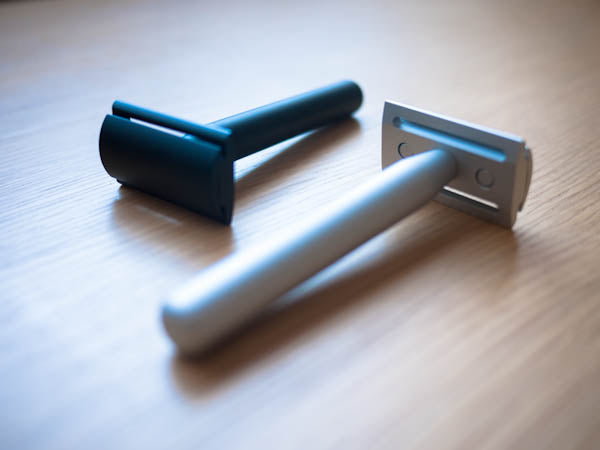What makes the "buttering burnt toast" sound when shaving? If there is sound, there is vibration, but is it the razor blade or the hair vibrating (both?). My intuition is that it's the blade but I don't have any evidence.
It seems like the variables influencing the vibration are the blade angle (shallower angle is quieter), blade sharpness (sharper is quieter), and the razor head design. It's that last one that interests me the most; we were just having a discussion about it in another thread.
The Great Rigid Blade Experiment
My hypothesis is that "clamping distance" and "free-end distance" play a role. Other variables held constant (same cutting angle, same razor sharpness), I think that razors with smaller clamping distance will be quieter. Here is @ShavingByTheNumbers excellent diagram so you see what I mean by those terms.

So the questions that I have are the following:
1. What is causing the sound: vibration of the blade, the hair, or both?
2. Do the quieter razors have smaller clamping distances?
3. Do the quieter razors have shorter free-end distances?
4. Are quieter shaves more efficient in the sense that they cut hairs with less resistance and therefore less physical force/pressure?
5. Are quieter shaves more comfortable in the sense that they are less prone to cause skin irritation?
6. Are quieter shaves more comfortable in the sense that there is less of sensation of tugging?
Even you don't have a clue about any of the above, but you've got a very quiet razor, or a very loud razor, I'd be interested to know what the razor is. I'd also be interested to know you are a shallow angle shaver, a steep angle shave, or a neutral angle shaver (as defined in the diagram above) as well as what blade you typically use with the razor.
It seems like the variables influencing the vibration are the blade angle (shallower angle is quieter), blade sharpness (sharper is quieter), and the razor head design. It's that last one that interests me the most; we were just having a discussion about it in another thread.
The Great Rigid Blade Experiment
My hypothesis is that "clamping distance" and "free-end distance" play a role. Other variables held constant (same cutting angle, same razor sharpness), I think that razors with smaller clamping distance will be quieter. Here is @ShavingByTheNumbers excellent diagram so you see what I mean by those terms.

So the questions that I have are the following:
1. What is causing the sound: vibration of the blade, the hair, or both?
2. Do the quieter razors have smaller clamping distances?
3. Do the quieter razors have shorter free-end distances?
4. Are quieter shaves more efficient in the sense that they cut hairs with less resistance and therefore less physical force/pressure?
5. Are quieter shaves more comfortable in the sense that they are less prone to cause skin irritation?
6. Are quieter shaves more comfortable in the sense that there is less of sensation of tugging?
Even you don't have a clue about any of the above, but you've got a very quiet razor, or a very loud razor, I'd be interested to know what the razor is. I'd also be interested to know you are a shallow angle shaver, a steep angle shave, or a neutral angle shaver (as defined in the diagram above) as well as what blade you typically use with the razor.



 Great thread!
Great thread!